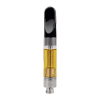What is HHC and how does it differ from CBG?
HHC, or Hexahydrocannabinol, is a hemp-derived cannabinoid known for its potent psychoactive effects. CBG, or Cannabigerol, is a non-psychoactive cannabinoid with potential health benefits. Both interact with the body’s endocannabinoid system, but HHC offers a unique ‘high’ without the paranoia often associated with THC.
How does HHC interact with the human body?
HHC interacts with the body’s endocannabinoid system, specifically binding to the CB1 and CB2 receptors. This interaction can lead to feelings of relaxation, euphoria, and enhanced sensory perception.
What are the potential benefits of HHC?
HHC has been reported to provide relief from stress, anxiety, and pain. It also offers a gentle high that can enhance mood and focus without the intense effects of THC.
Can CBG get you high like HHC?
No, CBG is a non-psychoactive cannabinoid. While it has potential health benefits such as anti-inflammatory and neuroprotective properties, it does not produce the psychoactive effects that HHC does.
What have users reported about HHC?
Users have reported a range of positive experiences with HHC, including mood upliftment, stress relief, and clear focus. Its gentle high is often described as enjoyable without being overwhelming.
Is HHC legal?
Yes, as a hemp-derived product, HHC is legal in most jurisdictions where hemp is legal. However, laws can vary by location so it’s always best to check local regulations.
Understanding HHC and CBG
When it comes to the world of cannabinoids, two names that often come up are HHC (Hexahydrocannabinol) and CBG (Cannabigerol). But what exactly are these compounds and how do they differ from each other?
HHC is a hemp-derived cannabinoid known for its potent psychoactive effects. It's a relative newcomer in the cannabinoid scene but has quickly gained popularity due to its unique properties. Unlike THC, HHC offers a 'high' without the paranoia often associated with other psychoactive substances. This makes it an attractive option for those seeking the benefits of cannabinoids without the intense side effects. For a more detailed understanding of HHC, you can check out this [article](https://hhcherb.com/article/understanding-hhc-compounds).
On the other hand, CBG is a non-psychoactive cannabinoid that has been studied for its potential health benefits. It's often referred to as the 'mother of all cannabinoids' because it serves as a precursor to other cannabinoids like THC and CBD. While it doesn't produce a 'high' like HHC or THC, research suggests that CBG may have anti-inflammatory, neuroprotective, and other beneficial properties. You can learn more about CBG in this [article](https://hhcherb.com/article/understanding-cbd-hhc-cannabinoids).
> "Both HHC and CBG interact with the body's endocannabinoid system, but they do so in different ways and produce different effects."
Here's a quick rundown of their differences:
- **Psychoactive properties:** HHC is psychoactive, meaning it can alter your state of mind or consciousness. CBG, however, is not.
- **Origin:** Both are derived from hemp, but HHC is a synthetic cannabinoid while CBG is naturally occurring.
- **Effects:** HHC can produce feelings of relaxation and euphoria, while CBG is more known for its potential health benefits.
Understanding these differences can help you make an informed decision about which cannabinoid might be right for you. Remember, everyone's body reacts differently to cannabinoids, so it's important to start slow and monitor your reactions.
Analyzing the Effects of HHC and CBG
When it comes to understanding the effects of HHC and CBG, it's crucial to delve into how these cannabinoids interact with the human body.
HHC, being a psychoactive compound, binds to the CB1 and CB2 receptors in the body's endocannabinoid system. This interaction can lead to feelings of relaxation, euphoria, and enhanced sensory perception. It's like being on a gentle roller coaster ride - thrilling yet not overwhelming. You can learn more about HHC's interaction with the human body [here](https://hhcherb.com/article/hhc-human-body-interaction).
On the flip side, CBG, despite being non-psychoactive, also interacts with the endocannabinoid system but in a different manner. It's more like a health supplement that works behind the scenes to potentially offer anti-inflammatory and neuroprotective benefits.
Here's a comparative table to help you understand better:
| Cannabinoid | Interaction with Endocannabinoid System | Effects | |-------------|---------------------------------------|---------| | HHC | Binds to CB1 and CB2 receptors | Relaxation, euphoria, enhanced sensory perception | | CBG | Interacts differently with endocannabinoid system | Potential anti-inflammatory and neuroprotective benefits |
Remember, these effects can vary from person to person based on factors like dosage, individual body chemistry, and method of consumption.

While both HHC and CBG have their unique effects, it's important to note that research is still ongoing. For a deeper dive into how HHC interacts with the endocannabinoid system, check out this [article](https://hhcherb.com/article/hhc-endocannabinoid-system).
Potential Benefits and User Experiences
When it comes to the potential benefits of HHC and CBG, user experiences can provide valuable insights.
HHC, with its psychoactive properties, has been reported to provide relief from stress, anxiety, and pain. Users often describe a gentle high that enhances mood and focus without the intense effects of THC. It's like finding a sweet spot where you're neither too high nor too low - just perfectly balanced.
> "HHC offers a gentle high that can enhance mood and focus without the intense effects of THC."
For more on the benefits and differences between HHC and THC, check out this [article](https://hhcherb.com/article/hhc-vs-thc-benefits-differences-downsides).
On the other hand, CBG, being non-psychoactive, doesn't offer a 'high'. However, it's been studied for potential health benefits such as anti-inflammatory and neuroprotective properties. While research is still ongoing, some users have reported positive effects on their overall well-being.
Here's a quick list of reported benefits from users:
- HHC: Mood upliftment, stress relief, clear focus - CBG: Potential anti-inflammatory and neuroprotective benefits
Remember, these are user-reported experiences and may vary from person to person. Always start with a low dose and monitor your body's reactions.
For more on user experiences with HHC, particularly its mood-uplifting and stress-relieving effects, you can read this [article](https://hhcherb.com/article/gentle-high-with-hhc-mood-upliftment-stress-relief-clear-focus).

While both HHC and CBG have their unique potential benefits, it's important to remember that everyone's experience can be different. Always consult with a healthcare professional before starting any new supplement regimen.







